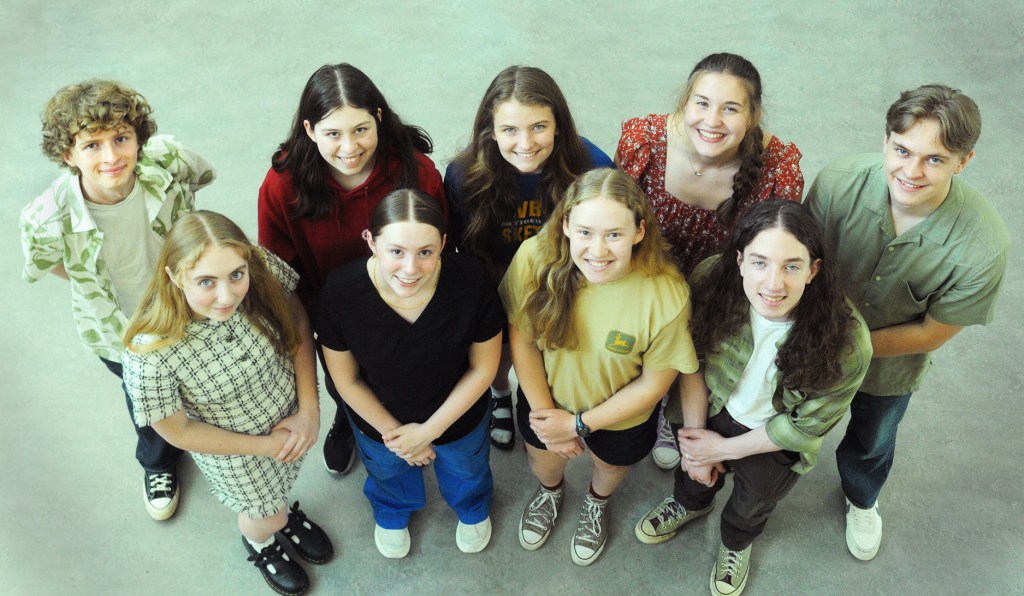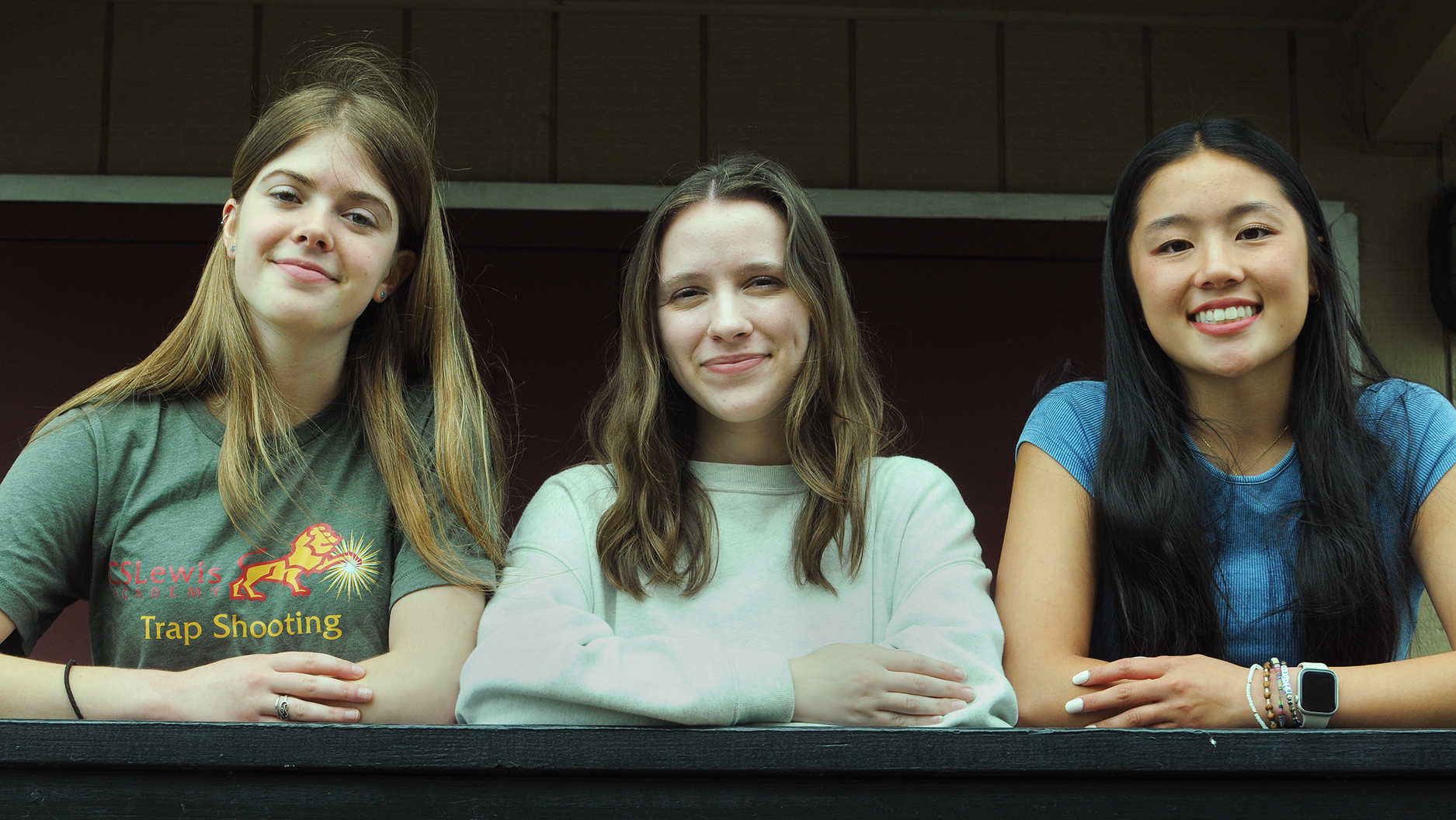Newberg High valedictorians and salutatorian: The best and the brightest
Published 11:00 pm Friday, May 30, 2025

- The students honored as valedictorian or salutatorian include (back row) Oliver Kolbet, Reese Gutierrez, Sophia Taylor, Emma Kriehn and Jack Harris. Front row, from left: Audrey Harris (salutatorian), Novalee Johnstone, Emma Rathkey and Cael Woolsey. (Staff photo: Gary Allen)
Eight selected to earn the school’s highest honors
Their caps and gowns fitted, their classwork completed and with the commencement ceremony days away, those Newberg High School students chosen as valedictorians and salutatorians have only to walk across the stage on June 6 and accept their diplomas in a job well done.
The school chose eight valedictorians and one salutatorian this year, which is far fewer than those named in years past. This year’s valedictorians, all 17 or 18 years old, include Novalee Johnstone, Sophia Taylor, Emma Kriehn, Jack Harris, Oliver Kolbet, Emma Rathkey, Cael Woolsey and Reese Gutierrez. Audrey Harris earned the title of salutatorian in the Class of 2025.
The Newberg Graphic reached out to each student with a few questions on their honors. Some answers have been edited for brevity.
What are your post graduation plans?
Johnstone: Attend Brigham Young University-Idaho in the fall to pursue a degree in nursing.
Taylor: Attend Bushnell University to study history.
Kriehn: Attend Gonzaga University this fall to study history, with the hopes of becoming a history teacher.
Jack Harris: Attend college at Brigham Young University in Utah.
Kolbet: Attend college at Western Washington University.
Rathkey: Attend Oregon State University to major in fisheries and wildlife conservation before pursuing graduate school.
Woolsey: Attend college at Western Washington University
Gutierrez: Attend college at Embry-Riddle Aeronautical University in Prescott, Arizona, pursue a degree in aeronautical science and become a pilot.
Audrey Harris: Study illustration and cinematic arts at George Fox University.
What does it mean to be named a valedictorian or salutatorian?
Johnstone: “I think this is a really big honor, and I’m glad I stuck with it and achieved something so cool. I’ve had to teach myself a lot of dedication to get to this point, and I’m grateful for all the lessons learned along the way.”
Taylor: “Being a valedictorian is a great honor. I feel proud and acknowledged for all of my hard work over the past four years.”
Kriehn: “Being named valedictorian gives meaning to all of the hard work I put into my studies throughout high school. I am so honored to be able to represent the Class of 2025 and be recognized with this distinction.”
Jack Harris: “I feel proud of my accomplishment. It confirmed to me that if I set my mind to something and work hard, I can do it, even if it is difficult. It is a huge honor. I was able to achieve valedictorian through the guidance of my teachers, family, and friends. I’m so thankful to everyone who helped me reach my goal.”
Kolbet: “For me, the label of valedictorian represents the time and effort put into my high school classes and career.”
Rathkey: “To me, being a valedictorian is a reminder of the work I put in to set myself up well for the future, and I just thought it would be cool to have another thing to wear at graduation.”
Woolsey: “It represents my academic achievement and, more importantly, my commitment to making things harder on myself.”
Gutierrez: “It gives me a great sense of pride for the accomplishment and sacrifice I made during my high school years, as well as appreciation and gratitude for the support I’ve received from my family, teachers and (counselors).”
Audrey Harris: “For me, being named salutatorian is the finish line to a four-year goal I set coming into my freshman year. While it may be a little different from my expectations, I never gave up on it, and it makes me happy to be recognized for my efforts.”
What were the extracurricular activities (sports, theater, etc.), that contributed to you being named a valedictorian/salutatorian?
Johnstone: “I think the work and effort I put into tennis and all other extracurricular activities in my life taught me that it’s important to give something your absolute all and see it through until you’re satisfied. That’s a lesson I’ll keep with me for the rest of my life.”
Taylor: “Cross country, track and National Honor Society are all extracurricular activities that helped me become a valedictorian. They taught me valuable lessons about determination and dedication that helped me succeed academically.”
Kriehn: “Throughout high school, I have participated in a number of extracurricular activities, including volleyball and basketball for four years and track for one year. Each of these activities taught me responsibility and work ethic and, believe it or not, helped me stay organized, as the busy nature of my schedule forced me to manage my time effectively.”
Jack Harris: “I invested a lot of time and energy into extracurricular activities like theater, church, chess club, honors society and volunteer work. They were a fun diversion from school. (National) Honor Society helped me get out into the community to serve. Helping those in need and interacting with other volunteers made me feel like part of a community. Those moments lifted my own spirits and made my hard work feel worth it.”
Kolbet: “The theater program was an excellent extracurricular to take in high school, as it introduced me to a supportive group of friends and was a fun creative outlet to complement my academic workload. It really helped me get through tough days and always provided me with concrete goals to work toward.”
Rathkey: “I participated in band, choir, theater, private music lessons and church events throughout my time in high school. Being involved in these activities definitely helped me build community and form traits like dedication and perseverance. My involvement in them also made high school much more enjoyable and made it feel like I had more of a reason to be there. I always had stuff outside of school that I was working toward, which I think is really important.”
Woolsey: “Theater has helped me a lot in becoming a valedictorian. It gave me a supportive community to study long hours with. It gave me a fun activity to keep me sane through high school. Most importantly, however, were the skills and friends I got from it that have nothing to do with academic achievement and everything to do with a meaningful life.”
Gutierrez: “The relationships from my sports provided balance in my life and helped feed my competitive spirit.”
Audrey Harris: “I was involved in theater and choir all four years of high school. I also did dance and band up until last year. Participating in performing arts has always been a creative outlet from my schoolwork and an important part of my life. There were some days I spent over 14 hours at the school, arriving for zero period and not leaving until well after 9 p.m. Within the music and theater program, there were many hard workers who inspired me to continue working hard as well.”
Was becoming a valedictorian/salutatorian your plan when you entered high school?
Johnstone: “Yes, this is a far off goal I’ve always tossed around in my mind, but once I actually entered high school I decided to commit myself to it, and I’m proud of how it’s all turned out.”
Taylor: “While becoming a valedictorian wasn’t necessarily my specific goal, I have always worked hard to challenge myself academically and maintain good grades.”
Kriehn: “While it was always my goal to get the honors diploma, I did not enter high school with the goal of being named valedictorian. Instead, my goal was always to give my absolute best in every class that I took, which eventually resulted in being recognized as valedictorian.”
Jack Harris: “It wasn’t my original plan to become valedictorian. My original goal was to prove to myself that I was smart by taking challenging classes. Becoming valedictorian became my goal later when I realized I could take on challenges and I could aim higher.”
Kolbet: “Yes, my counselor, Angela Kantz, helped me plan the academic side of my high school experience, and we decided that I would prepare for an honors diploma. I aimed for a 4.0 unweighted GPA, and soon found out that these were the two requirements for becoming a valedictorian.”
Rathkey: “Yes, I hoped to be a valedictorian. It seemed like an achievable goal for me, so I went for it!”
Woolsey: “No, but after I finished my freshman year with a 4.0 GPA I just sort of continued to get all As.”
Gutierrez: “It was not my plan. I didn’t even intend on pursuing an honors diploma when I started freshman year. It wasn’t until sophomore year that I started to think about becoming valedictorian.”
Audrey Harris: “Yes. I went into high school with the endeavor to get all As and strive for academic integrity.”
Was qualifying to become a valedictorian or salutatorian difficult?
Johnstone: “Yes and no. I love learning more than anything, so being in challenging classes and pushing myself to succeed at an accelerated placement was exciting and fun for me. I will say that the challenging aspect was the free time and relaxation I sacrificed to accomplish this goal.”
Taylor: “Yes, it took a lot of effort and hard work, and I am grateful to see that it paid off.”
Kriehn: “Yes, qualifying to become a valedictorian was difficult. To achieve this honor, I had to take a number of accelerated and advanced classes, which led to many extra hours of classwork outside of school. It was often difficult to stay motivated to accomplish this extra work.”
Jack Harris: “Yes. It took lots of studying and homework. I spent long hours at my kitchen table pushing through homework because I cared. I had something to prove, and I’m so glad I did.”
Kolbet: “The necessary classes for an honors diploma were not particularly difficult to forecast for and take. Most classes were not too difficult on their own, but the combined work from all of them was at times a challenge.”
Rathkey: “It definitely took some focus but because it lined up with my other goals for myself, it wasn’t too difficult. I had some struggles but there was a lot of really good support along the way.”
Woolsey: “For me, only kind of. I have always been good at school and, once I saw the requirements, I always believed it was achievable. With that said, I still spent countless hours struggling with classes and banging my head against homework.”
Gutierrez: “It was difficult. I had to balance late nights, early mornings and being intentional about accomplishing my goal.”
Audrey Harris: “Yes. Throughout my high school career, I juggled taking performing arts, honors, advanced and college classes. I spent a lot of time in extracurriculars so it was difficult staying on top of things and working to gain understanding, especially during the process of performing in a show. I ended up with one B in pre-calculus my sophomore year, but I aced calculus with a high A five months later. I’m proud of this achievement.”





